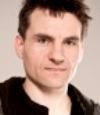|
WORKSHOP - NEURAL CORRELATES Sunday, MAY 1, 2011 (Afternoon) Time and Location: TBA RON CHRISLEY DAVID GAMEZ
FROM NEURAL CORRELATES TO FALSIFIABLE PREDICTIONS: HOW CONSCIOUSNESS RESEARCH CAN BECOME MORE SCIENTIFIC
Although the scientific study of consciousness has made a great deal of progress in recent years, there is still an extensive debate about what is meant by ‘consciousness’, and a large number of conflicting theories have been put forward. These problems are highlighted by Metzinger (2003), who claims that the science of consciousness is in a pre-paradigmatic state. Similarly, Coward and Sun (2007, p. 947) argue that our understanding of consciousness suffers from “considerable metatheoretical confusion”. One source of these problems is that most consciousness research has been broadly inductive in character and there has been very little emphasis on falsifiable predictions that can be used to discriminate between different theories (Popper, 2002). As Crick and Koch (2000, p 103) point out, if the science of consciousness is to move forward it needs to make predictions according to competing theories and use empirical measurements to eliminate theories that make bad predictions. The first part of the tutorial will provide some philosophical background to these problems, followed by a historical introduction to the philosophy of science that explains the importance of falsifiable predictions and the unique characteristics of scientific theories. The current state of consciousness research will then be covered, including work on the neural correlates of consciousness and the characteristics of the available data. The tutorial will then explore the attempts that have been made to develop algorithmic, mathematical and robotic models of theories of consciousness, and the extent to which these can make falsifiable predictions. After explaining some of the tools that are available for generating predictions about a system’s consciousness, the tutorial will conclude with a brain storming session exploring how current theories of consciousness could be empirically tested. This tutorial would be of interest to people with a scientific background who would like to see consciousness research develop into a fully scientific research area. It would also be useful for people working on philosophical or cognitive theories of consciousness who would like to test their theories on empirical data. Ron Chrisley David Gamez Centre for Research in Cognitive Science Department of Computing School of Informatics, University of Sussex Imperial College, London
Ron Chrisley David Gamez
The half day workshops are open to the public; registration required Student $76 Standard $96 ONLINE: TSC TOWARD A SCIENCE OF CONSCIOUSNESS Online Payment System Conference Participants may sign up for optional workshops at any time. General Public - please open a general registration. You may just choose Workshops.
|
|
|||||||||||||


